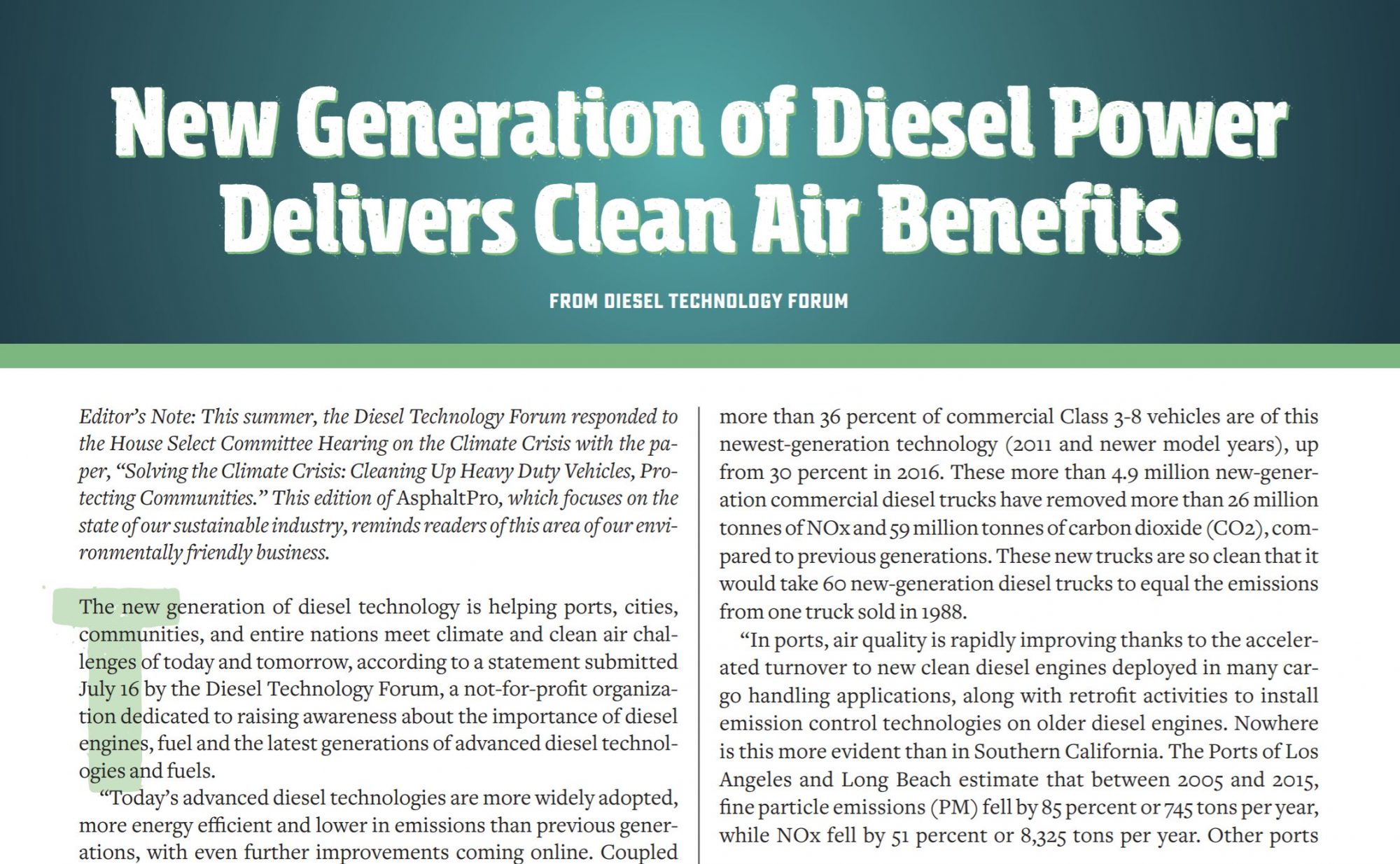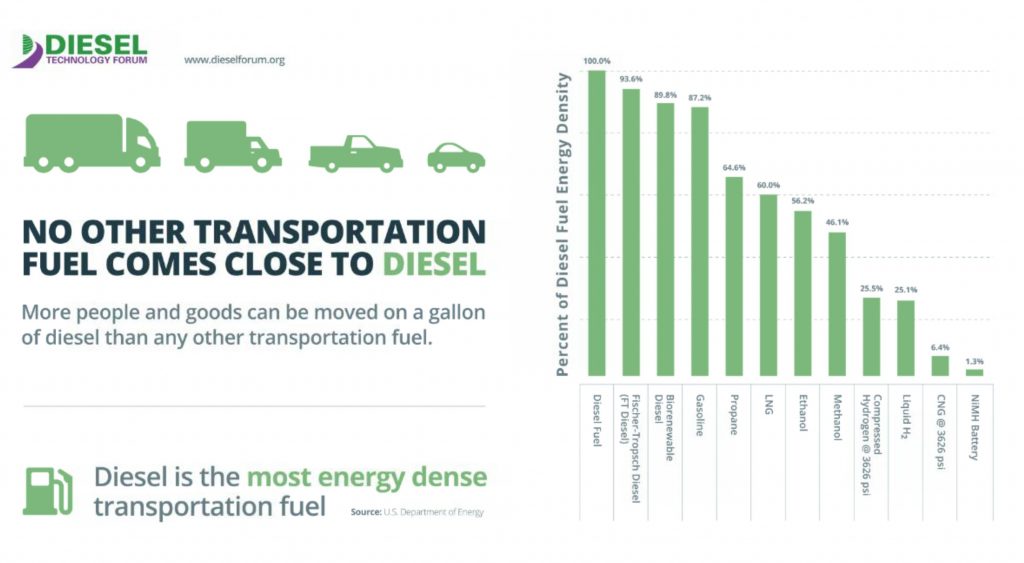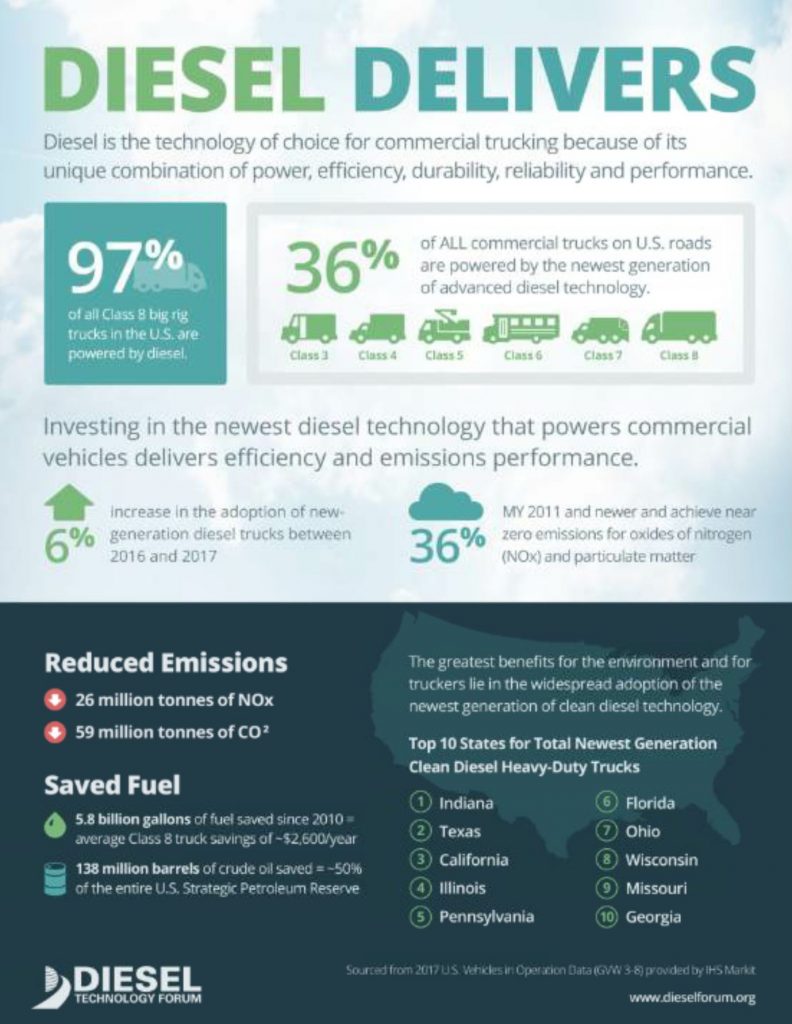New Generation of Diesel Power Delivers Clean Air Benefits
BY Diesel Technology Forum

Editor’s Note: This summer, the Diesel Technology Forum responded to the House Select Committee Hearing on the Climate Crisis with the paper, “Solving the Climate Crisis: Cleaning Up Heavy Duty Vehicles, Protecting Communities.” This edition of AsphaltPro, which focuses on the state of our sustainable industry, reminds readers of this area of our environmentally friendly business.
The new generation of diesel technology is helping ports, cities, communities, and entire nations meet climate and clean air challenges of today and tomorrow, according to a statement submitted July 16 by the Diesel Technology Forum, a not-for-profit organization dedicated to raising awareness about the importance of diesel engines, fuel and the latest generations of advanced diesel technologies and fuels.
Industry Incorporates Sustainability at Asphalt Production Plants – Part II
“Today’s advanced diesel technologies are more widely adopted, more energy efficient and lower in emissions than previous generations, with even further improvements coming online.
Coupled with growing success using advanced renewable bio-based fuels, diesel engines are well-positioned for the future of goods movement in America and around the world,” said the Forum’s executive director, Allen Schaeffer. “As elected officials debate our future energy and technology paths, we must not take our eye off the importance of continued progress today and technologies like diesel that are delivering substantial climate benefits and clean air and economic progress on a wide scale, now. Getting more new-technology diesel engines on the road will deliver the biggest clean air impacts at the lowest cost, while also helping achieve climate goals.”

Schaeffer continued: “As verified by the Health Effects Institute Advanced Collaborative Emissions Study (ACES), the emissions control technologies present in the newest-generation diesel applications—technologies meeting U.S. 2007/2010, Euro VI/6, China 6, and Bharat Stage VI (India) standards—deliver dramatic improvements in emissions. The study affirmed that the aftertreatment technologies used in modern diesel engines are highly effective: diesel particulate filters reduce particulate matter (PM) emissions by more than 90 percent, and selective catalytic reduction systems reduce smog-forming nitrogen oxide (NOx) emissions by 94 percent. Researchers also noted that ‘the overall toxicity of exhaust from modern diesel engines is significantly decreased compared with the toxicity of emissions from traditional-technology diesel engines.’
“Today, diesel remains the dominant technology in long-haul trucking, powering 97 percent of Class 8 big-rig trucks in the United States. A growing percentage of diesel-powered commercial trucks rely on the newest-generation diesel technologies, which deliver near-zero emissions performance while using less fuel: today, more than 36 percent of commercial Class 3-8 vehicles are of this newest-generation technology (2011 and newer model years), up from 30 percent in 2016. These more than 4.9 million new-generation commercial diesel trucks have removed more than 26 million tonnes of NOx and 59 million tonnes of carbon dioxide (CO2), compared to previous generations. These new trucks are so clean that it would take 60 new-generation diesel trucks to equal the emissions from one truck sold in 1988.
Asphalt Industry Increases its Environmentally Friendly Use of Materials
“In ports, air quality is rapidly improving thanks to the accelerated turnover to new clean diesel engines deployed in many cargo handling applications, along with retrofit activities to install emission control technologies on older diesel engines. Nowhere is this more evident than in Southern California. The Ports of Los Angeles and Long Beach estimate that between 2005 and 2015, fine particle emissions (PM) fell by 85 percent or 745 tons per year, while NOx fell by 51 percent or 8,325 tons per year. Other ports have also reported similarly impressive emission reductions. The overwhelming majority of these clean air achievements are attributable to the introduction of clean diesel technology, rather than to alternative fuels.

“Furthermore, the U.S. Environmental Protection Agency (EPA) and National Highway Traffic Safety Administration (NHTSA) estimate that the Commercial Vehicle Fuel Economy and Greenhouse Gas Reduction Standards Phase 1 rules saved 270 million tons CO2 and 530 million barrels of oil between 2014 and 2018, and that the Phase 2 rules will save another 1 billion tons of CO2 and nearly 2 billion barrels of oil between 2021 and 2027. Knowing that the majority of medium and heavy-duty trucks run on diesel, and that the larger benefits are derived from Class 8 trucks that are almost exclusively run on diesel, it is safe to say the majority of these CO2-reduction benefits are delivered by diesel technologies.
“Even further progress for lower emissions is on the horizon, as truck and engine manufacturers are engaged with the U.S. EPA and the California Air Resources Board (CARB) on the Clean Truck Initiative, developing tomorrow’s generation of diesel engines. From coupling with hybrid-electric technology and battery-storage systems, to pushing thermal efficiency boundaries, to advanced waste-heat recovery systems, to utilizing high-quality advanced renewable biodiesel fuels, new-generation advanced diesel technology is uniquely suited to enable commercial trucking to contribute to our sustainable future.
Continued Investment in the Future of Diesel
“Even as manufacturers explore other fuels and technology options, continued investments in diesel are strong indicators about the future for advanced diesel engines. Thirteen states are home to heavy-duty diesel engine manufacturing, supporting $3.4 trillion in U.S. economic activity and more than 1.25 million American jobs.
“With well-established service and refueling networks across the United States to ensure maximum up-time, diesel is the proven partner in today’s overnight, same-day, just-in-time delivery world. Diesel remains the most energy-efficient internal combustion engine, one that offers an unmatched number of choices in size and performance for the broadest range of commercial vehicle operations. Along with near-zero emissions performance, choosing diesel ensures endless flexibilities in routing and operations to meet the ever-changing needs of customers.
Bio-based Diesel Fuels are a Proven Climate Solution Today
“Even though battery electric technologies get most of the headlines, it is diesel engines in commercial trucks and buses using advanced bio-based diesel fuels that deliver the most results.
Look at California: in 2018, California’s use of biodiesel and renewable diesel fuels eliminated 4.3 million tons of CO2. Meanwhile, electric cars and trucks in the state resulted in only 1.2 million tons of CO2 reductions in 2018—one third of the emissions reductions delivered by diesel engines using biodiesel fuels. Biodiesel’s contribution even exceeding the reductions delivered by ethanol. Since the state’s Low Carbon Fuel Standard (LCFS) program began in 2011, biodiesel and renewable diesel fuel have eliminated more than 18 million tons of CO2, according to CARB.”
For more information visit here.
